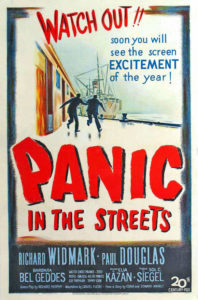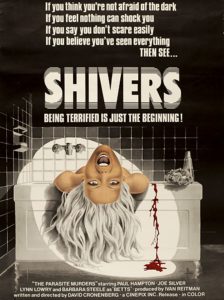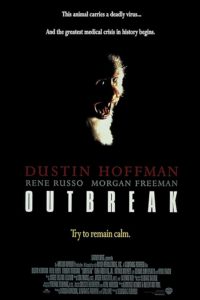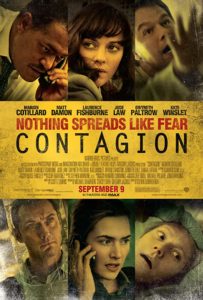By: Cormac Riordan, Staff
Panic in the Streets
 This 1950 feature from Elia Kazan is a grimy, paranoid, unconventional noir filled with gangsters, cops, and of course, disease. Ironically, the bulk of the film is about trying to contain the titular panic, mostly done so by the lead, Richard Windmark, playing against type as the heroic Dr. Clint Reed of the Public Health Services. A man is killed in a poker game gone awry and Reed diagnoses the deceased as having pneumonic plague, a Dickensian disease that leaves one bedridden before dying swiftly. Reed, with a few other government workers in tow, set off to find anyone who has had contact with the man, but especially his killer.
This 1950 feature from Elia Kazan is a grimy, paranoid, unconventional noir filled with gangsters, cops, and of course, disease. Ironically, the bulk of the film is about trying to contain the titular panic, mostly done so by the lead, Richard Windmark, playing against type as the heroic Dr. Clint Reed of the Public Health Services. A man is killed in a poker game gone awry and Reed diagnoses the deceased as having pneumonic plague, a Dickensian disease that leaves one bedridden before dying swiftly. Reed, with a few other government workers in tow, set off to find anyone who has had contact with the man, but especially his killer.
While the disease plot line is timely and there are many moments in the film that recall our current situation (when cops grumble about having to be vaccinated or when restaurant employers ignore signs to keep their business open), but the heart of the film is with Dr. Reed. He’s a man down about his place in life, mocked by many he encounters: a reporter calls him “two-bit”, a cop asks how much he makes, and a neighbor seems to think he’d be a better father to Reed’s kid. It all turns around in a pivotal scene with his wife, played by Barbara Bel Geddes, Reed complains about his day and his position in life, only for her to tell her she’s sick of it. He needs to grow up and realize that he’s doing what he set out to, and has a lovely family and child. Geddes’ performance is what sells this necessary scene. She’s saying what has clearly gone unspoken for years, but it never feels like she’s cold or uncaring, or been holding a grudge. This speech is what gives Reed the confidence to cry out to an uncaring authority figure “we’re all in a community, the same one”, begging the government to take this disease seriously; a sentiment that has been expressed by many Americans lately.
Panic in the Streets is available for rental on YouTube.
Shivers

David Cronenberg’s first narrative feature from 1975 is a great gateway into the themes he would explore in other horror films throughout his career. But it’s also a film about disease. It takes place in a futuristic apartment building and every amenity offered by the outside world can be found right at home, from pools to doctors to grocery stores. One such business that resides in Starliner Towers is a team of scientists attempting to find an alternative to organ replacement by breeding a parasite that can take possession of a dead organ and essentially revive it. Of course, this goes horribly wrong, and what are essentially parasite controlled zombies begin to fill the halls of the apartment tower.
Shivers is definitely an early film from a great artist who hasn’t quite mastered his craft yet. That doesn’t make it a bad film by any means: a scene with a security guard referring to his gun as “an advertising gimmick”, citing a rival company that has armed guards, shows Cronenberg’s disdain for societal normalization of violence. Of course, there is no societal norm Cronenberg is concerned about more than sexuality, and Shivers explores that overtly. The scientist who created this blood seeking parasite held a secret desire to transform humanity from a thinking beast and into “one beautiful, mindless orgy”. Cronenberg grew up around the hippie generation and their insistence on free love unnerved him, translated here into bloody zombies that crave desire and little else. It isn’t the most subtle, or deeply explored, use of this theme in this work, but it’s fascinating to see where it all started, especially when that end result is a fun 70’s zombie flick.
Shivers is available for streaming on Hulu.
Outbreak

It looks hard to be in a movie with Dustin Hoffman. He’s such a natural actor even performers who are good can look stilted and measured next to him. Outbreak has that problem from time to time, but it’s hard to complain about a lead performance being too authentic. The plot here is simple enough, a disease breaks out and Hoffman’s Col. Daniels must figure out a cure before it’s too late. The twist here: the government has been secretly keeping this disease under wraps for decades, hoping to use it as a biological weapon.
The direction by Wolfgang Peterson is another boon to the film. A sort of 80s/90s version of the early Hollywood journeyman director, Peterson has operated in a variety of genres: science-fiction, action, war, historical drama. With his expertise in an array of film dialects, he makes the first two thirds of Outbreak thrilling to watch from a directional standpoint. He implements different styles of POV shots, such as a spinning camera effect that brings the audience into the perspective of the infected, and long tracking shots of government facilities that clue the viewer into the intricacies of government research. Unfortunately, the third act drags somewhat, a lot of helicopter shenanigans makes it feel a little silly, and Donald Sutherland unveils himself as a more overt, less interesting villain.
Outbreak is available for streaming on Netflix
Contagion

Directed by Steven Soderbergh, featuring an all star cast, this is not an easy film to watch right now. Unlike the other films listed here, it came out only nine years ago, and works the hardest to put the viewer in the world of the film, offering few rays of light in the pandemic nightmare it depicts. Soderbergh, no stranger to creating blockbusters that manage to be smart and entertaining, shoots the film as a highly stylized thriller, using a fast-paced opening montage of diseased people and long-range shots that effectively keep the audience away from possibly infected characters. Before the montage, the film opens with Paltrow and text appears on the bottom of the screen: Day 2. This has already begun.
The film jumps from character to character: Matt Damon plays Paltrow’s husband, Laurence Fishburne is a physician, Marion Cotillard a doctor with WHO, Jude Law a fear mongering blogger. They all feel real and timely, like they could’ve just come from our 2020 world of disease. Fishburne even drops that recently popular term in one scene, begging for people to “social distance”. Cliff Martinez’s pounding synth score keeps the viewer on edge, and both actors and writers sell medical jargon like “R nought” (the rate at which an infection multiplies) as accurate and believable.
In a final bit of dark irony, Dr. Ian Lipkin, the medical consultant to the film, recently came forward to say he has been diagnosed with Covid-19. Hopefully, during this crisis, Americans act a little better than they do in Contagion.
Contagion is available for rental on Amazon Prime and YouTube.

